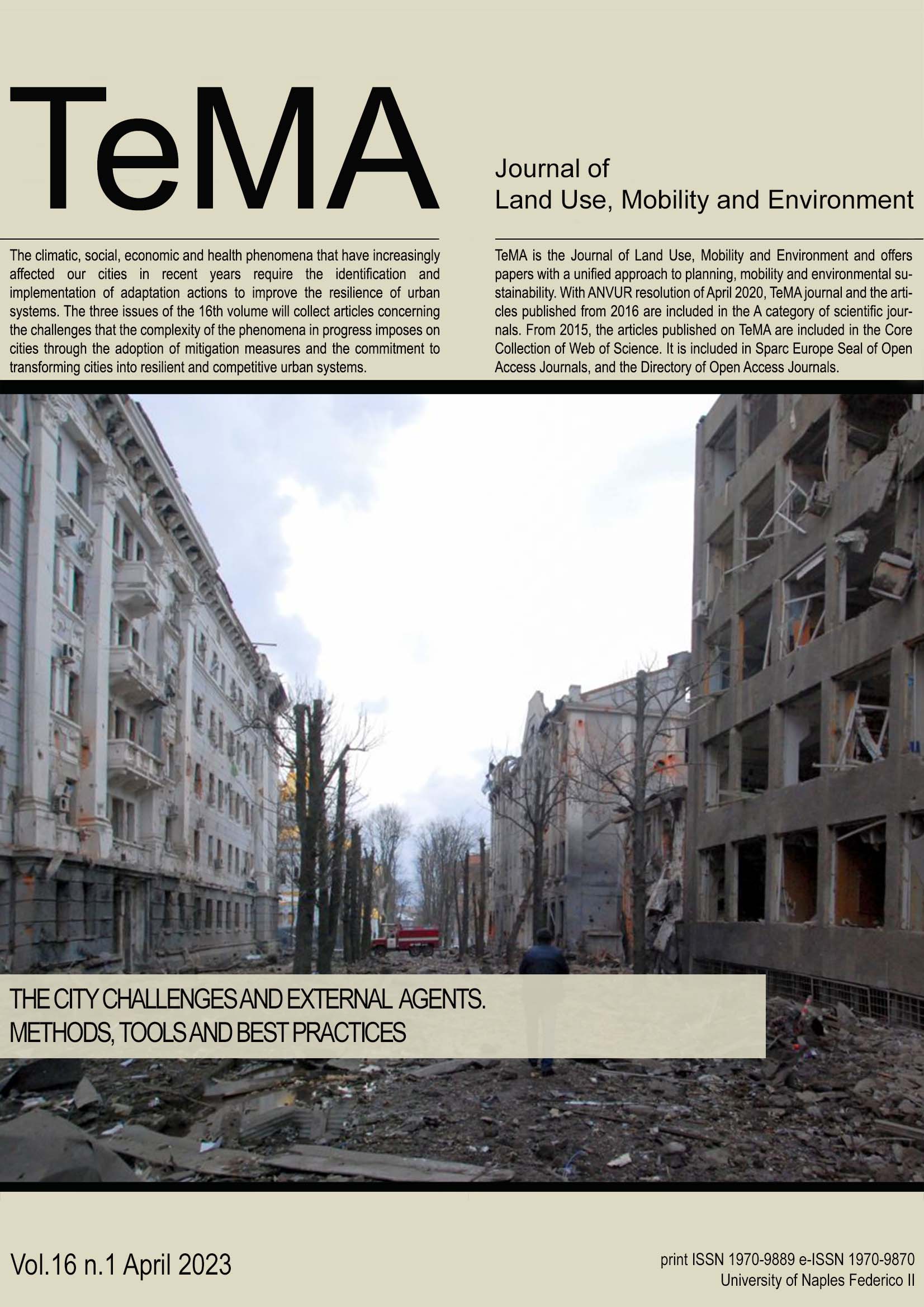City vs Energy consumptions: the role of new technologies
Abstract
Starting from the relationship between urban planning and mobility management, TeMA has gradually expanded the view of the covered topics, always remaining in the groove of rigorous scientific in-depth analysis. This section of the Journal, Review Notes, is the expression of continuously updating emerging topics concerning relationships between urban planning, mobility and environment, through a collection of short scientific papers written by young researchers. The Review Notes are made of four parts. Each section examines a specific aspect of the broader information storage within the main interests of TeMA Journal. In particular, the Urban planning literature review section presents recent books and journals on selected topics and issues within the global scientific panorama. This contribution aims at delving into the relationship between urban environments and energy consumption. Cities consume about 75% of global primary energy and emit between 50% and 60% of total greenhouse gases. As drivers of economic and social changes, cities play a key role in reducing energy consumption and increase energy efficiency. For the first issue of TeMA Journal volume no. 16, this Review Notes section is dedicated to books highlighting the role of new technologies in managing good-quality energy data, essential to support reliable decision-makers.
This contribution aims at delving into the relationship between urban environments and energy
consumption. Cities consume about 75% of global primary energy and emit between 50% and 60% of total
greenhouse gases. As drivers of economic and social changes, cities play a key role in reducing energy
consumption and increase energy efficiency. For the first issue of TeMA Journal volume no. 16, this Review
Notes section is dedicated to books highlighting the role of new technologies in managing good-quality
energy data, essential to support reliable decision-makers.
Downloads
References
Amado, M., & Poggi, F. (2022). Sustainable Energy Transition for Cities. Elsevier. ISBN: 9780128242773.
Battarra, R., Mazzeo, G. (2022). Challanges of Mediterranean metropolitan systems: smart planning and mobility. In M. Tira, G. Maternini, M. Tiboni (eds.), New scenarios for safe mobility in urban areas. Proceedings of the XXV International Conference Living and Walking in Cities (LWC 2021), Septem-ber 9-10, 2021, Brescia, Italy, Transportation Research Procedia, 60, 93-99. https://doi.org/10.1016/j.trpro.2021.12.013.
Coppola, P., & De Fabiis, F. (2020). Evolution of mobility sector during and beyond Covid-19 emergency: a viewpoint of industry consultancies and public transport companies. Sustainability, 12(22), 9517. https://doi.org/10.3390/su12229517
Eicker, U. (Ed.). (2022). Urban Energy Systems for Low-Carbon Cities. Elsevier. ISBN: 9780128115541.
Guida C. (2022). Energy saving and efficiency in urban environments: integration strategies and best practices. TeMA - Journal of Land Use, Mobility and Environment, 15(3), 517-531. https://doi.org/10.6093/1970-9870/9549
Intergovernmental Panel on Climate Change. (2021). Climate Change 2021: The Physical Science Basis. Contribution of Working Group I to the Sixth Assessment Report of the Intergovernmental Panel on Climate Change [Masson-Delmotte, V., Zhai, P., Pirani, A., Connors, S.L., et al. (eds.)]. Cambridge University Press. Retrieved from: https://www.ipcc.ch/report/ar6/wg1/
Mohan, S. K., John, A., Padmanaban, S., & Hamid, Y. (2022). Hybrid Intelligent Approaches for Smart Energy: Practical Applications. John Wiley & Sons. ISBN: 9781119821243
Papa, R., Gargiulo, C., & Battarra, R. (2016). Città Metropolitane e Smart Governance: Iniziative di successo e nodi critici verso la Smart City. FedOA – University Press, Naples (Italy). https://doi.org/10.6093/978-88-6887-005-8
Pilogallo A., Saganeiti L., Scorza F., & Murgante B. (2019). Ecosystem Services’ Based Impact Assessment for Low Carbon Transition Processes. TeMA - Journal of Land Use, Mobility and Environment, 12(2), 127-138. https://doi.org/10.6092/1970-9870/6117
Sgambati, S., & Gargiulo, C. (2022). The evolution of urban competitiveness studies over the past 30 years. A bibliometric analysis. Cities, 128, 103811. https://doi.org/10.1016/j.cities.2022.103811
Copyright (c) 2023 TeMA - Journal of Land Use, Mobility and Environment

This work is licensed under a Creative Commons Attribution 4.0 International License.
Authors who publish in this journal agree to the following:
1. Authors retain the rights to their work and give in to the journal the right of first publication of the work simultaneously licensed under a Creative Commons License - Attribution that allows others to share the work indicating the authorship and the initial publication in this journal.
2. Authors can adhere to other agreements of non-exclusive license for the distribution of the published version of the work (ex. To deposit it in an institutional repository or to publish it in a monography), provided to indicate that the document was first published in this journal.
3. Authors can distribute their work online (ex. In institutional repositories or in their website) prior to and during the submission process, as it can lead to productive exchanges and it can increase the quotations of the published work (See The Effect of Open Access)

